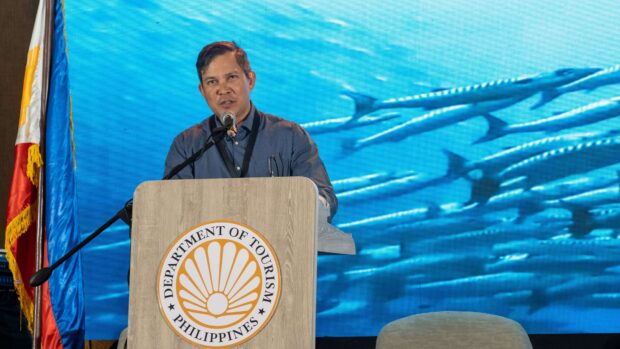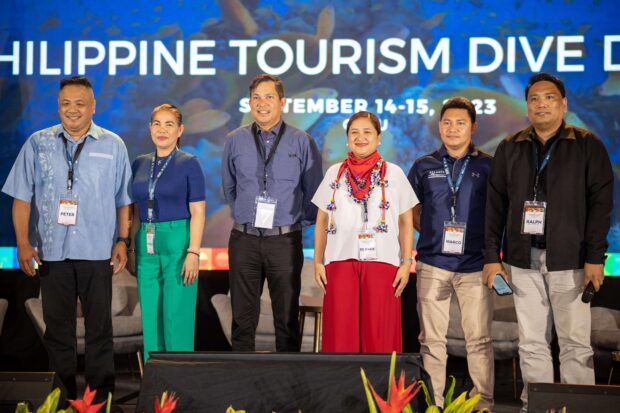Key learnings from the first Philippine Tourism Dive Dialogue
The country’s inaugural Philippine Tourism Dive Dialogue, spearheaded by the Department of Tourism, convened participants from the private and public sections to discuss challenges, opportunities, and insights on strengthening the country’s dive tourism industry.
At the Fili Hotel at Nustar Cebu, industry experts and stakeholders led panel discussions centered on the following: Marine Environmental Protection and Conservation; Dive Niche Products: Free Diving, Scuba Diving, Black Water Diving, and Underwater Photography; Philippine Dive: Domestic/International Marketing Campaign; Safety, Standards, and Accreditation of Tourism-related Enterprises (TREs) for Scuba Diving; and Investment Opportunities in the Dive Industry.
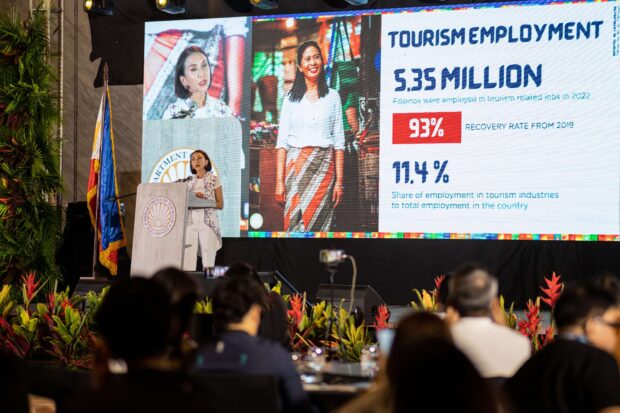
DOT Secretary Christina Frasco reports about the employment status in the tourism industry
Tourism Secretary Christina Garcia Frasco reiterated that the two-day event is crucial in sustaining the successes of the country’s dive tourism industry and in fulfillment of the directive of President Ferdinand R. Marcos, Jr. for the Philippines to attain a tourism industry that is “inclusive, where the benefits of tourism are felt far and wide across the countryside.”
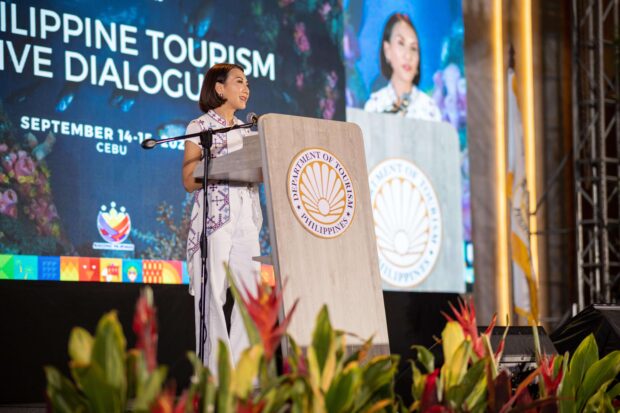
DOT Secretary Ma Christina C. Frasco spearheads the first-ever Philippine Tourism Dive Dialogues
“The effort, therefore, requires the ability to listen, to understand the prevailing challenges that are present and require solutions that can only be reached with collaboration, convergence, and unity. That is why early on, in the Marcos administration, we, in the Department of Tourism, mandated the formation of the very first DOT Dive Committee,” the DOT chief added. More than being the chair of the Dive Committee, Secretary Frasco has been a certified diver since 2008.
Insights from the Dive Dialogues
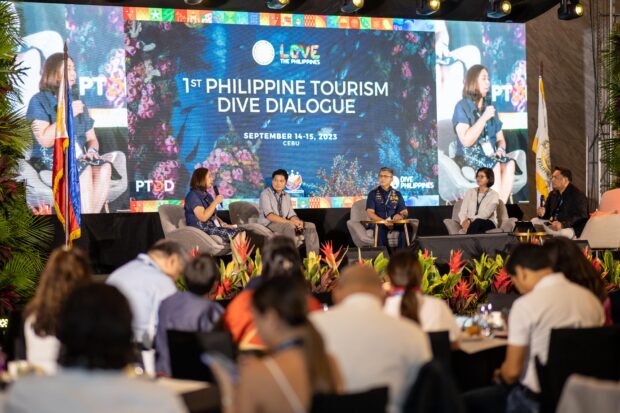
The talk on Marine Environmental Protection and Conservation, gathered insights from Angelique Songco, the Protected Area Superintendent (PASu) of the Tubbataha Reef and Natural Park; Robert Patrimonio; Tanya Rabat-Tan, Director of DOT Region XI; and Fra-And Timothy Quimpo, marine biologist and conservationist.
Panel 1, which focused on Marine Environmental Protection and Conservation, gathered insights from Angelique Songco, the Protected Area Superintendent (PASu) of the Tubbataha Reef and Natural Park; Robert Patrimonio; Tanya Rabat-Tan, Director of DOT Region XI; and Fra-And Timothy Quimpo, marine biologist and conservationist.
Quimpo started the panel discussion in citing habitat destruction as a diving-specific threat. He emphasized the need to strictly implement existing rules and policies to help nature heal itself. Whatever concerns you have in your region, now is the perfect time to sit down with the correct agencies and discuss these environmental issues and how to address [them],” he said.
CG Vice Admiral Patrimonio agreed with Quimpo’s sentiments, further putting stress on how the existing regulations lie on local government units to be fully implemented. For the coastal community, he mentioned that barangays can work hand-in-hand with the Coast Guard in implementing existing ordinances.
In terms of tourism activities that have directly contributed to protecting and restoring marine habitats, DOT Region XI Director Tan explained that if tourism activities are managed properly, it can be a powerful ally in not just marine, but any natural site conservation. She emphasized that the tourism industry thrives on authentic experiences, and in turn, it becomes a platform to raise awareness and educate locals and tourists alike.
Meanwhile, Songco touched on the rules of wildlife interaction in the Tubbataha Reef. “The rangers cannot watch every dive or every tourist that dives in Tubbataha, so we rely on the dive operators to implement these rules,” she said, emphasizing trust between rangers and dive operators in the region.
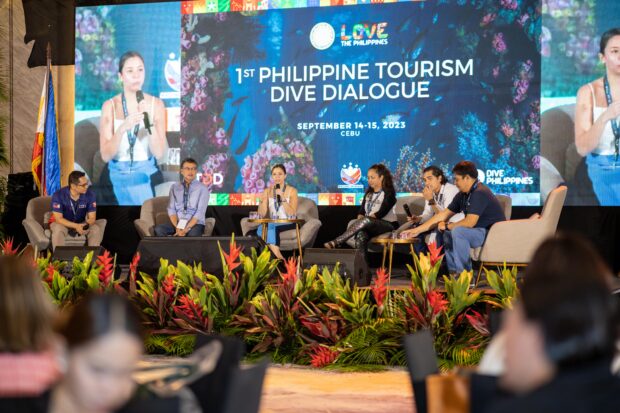
Another panel focused on Dive Products: Free Diving, Scuba Diving, Black Water Diving, and Underwater Photography. Professional underwater photographer and writer Scott Gutsy Tuason spoke with panelists Vanessa S. Vergara, Ocean Advocate, Certified Free Diver and Scuba Instructor; Juan G. Naval, Technical Expert/Advocate; Jaime J. Sarte III, PADI Instructor; and Arabelle Jimenez, Mermaid Trainer and Journalist.
Panel 2 focused on Dive Products: Free Diving, Scuba Diving, Black Water Diving, and Underwater Photography. Professional underwater photographer and writer Scott Gutsy Tuason spoke with panelists Vanessa S. Vergara, Ocean Advocate, Certified Free Diver and Scuba Instructor; Juan G. Naval, Technical Expert/Advocate; Jaime J. Sarte III, PADI Instructor; and Arabelle Jimenez, Mermaid Trainer and Journalist.
Vergara stressed that there are several different trainings that you can do for diving, and opportunities abound not only in the Philippines, but globally. “The freediving trend is growing not only in the Philippines but around the world. And here in the Philippines, this is the perfect time to have a dialogue like this because everyone is still learning. There are different dive shops here, but [it’s] only now that they’re beginning to look into freediving because of the demand.”
Meanwhile, Naval stressed that technical diving requires students to have a great deal of perseverance and patience. “You need a lot of time in the water. There’s no better teacher than time in the water.”
In terms of mermaiding, Jimenez likened it to performance art. “It’s actually similar to freediving with different equipment. It’s more than a sport. It’s also a performing art where we put out our creativity. And so when we go mermaiding we don’t really use a mask, we don’t use a snorkel, we open our eyes, we smile. It’s a different skill set, but it can be learned.”
She further explains that with mermaiding, dive operators or resorts can have an extra activity for the whole family. It also helps diving parents to focus while they’re out in the water, as the kids can do mermaiding and be taught about environmental awareness. Jimenez shared that the next generation of Filipino divers can learn mermaid swimming first because it is an entry to overcome their fear of water.
Panel 3 discussed domestic and international marketing campaigns for the diving tourism industry. Led by Marga Nograles, the Chief Operating Officer of the Tourism Promotions Board, the panel included Daneil Stracy, Managing Director of Lalaguna Villas in Puerto Galera; Rowena M. Sorioso, Head, Product and Market Development of Dive and Nature-Based Tourism, Office of Product and Market Development, DOT; Cha E. Ocampo, Travel and Lifestyle Content Creator, and Certified Freediver; and Karina Rosa Tiopes, Regional Director, DOT Region VIII.
“The Secretary always reminds us as the Tourism Promotions Board that we are to reach out to all our regional directors because the only way we can do this is [to work] together,” Nograles said.
“The economic benefits generated by the [diving industry] have positively impacted local communities, generating employment and fostering growth for the people living in our country. Consequently, it is because of these gains that we must make every effort to safeguard our resources because these are crucial to people’s livelihoods. That is why we at the TBP ensure that conservation and sustainable development are integrated into all tourism activities.”
On their part, Stracy shared that they rely a lot on technology to promote their dive shows and products. “The [dive] shows themselves are an integral part of our marketing objectives now. We do a lot of domestic marketing as well. We do a lot of Facebook sponsored ads, Instagram, Whatsapp. We also do Google AdWords.”
Ocampo noted that social media content creators have to understand their responsibility as a marketing person as well. “We are always on social media, and we’re kind of like our own team. We know our way and how we can effectively market. When we market, we have to really be passionate about what we do. I see that most people who are passionately promoting what they love is a very effective way of marketing certain products, or, in this case, diving.”
Meanwhile, Tiopes and Sorioso extend their gratitude to Secretary Frasco for having the visionary leadership to include dive tourism in her agenda.
“We are lucky now with Secretary Christina Francisco with her 7-point agenda—she really said equal opportunities for everyone. We do marketing side by side with the big players. So, that is what is in store for our stakeholders. No matter how small, we’re pretty sure that we will be given a chance because our leaders now in DOT really see to it that way–walang iwanan,” the regional director said.
“We’re very fortunate to have the support of the Secretary in mounting high-impact events like the Philippine International Dive Expo. We invite our foreign counterparts abroad to do business-to-business meetings with our small and big players here in the Philippines. Afterward, [we will be able] sell our destinations and its properties through the hosting of post-familiarization dive tools. [Through this, we can give] equal opportunities to all emerging and developed destinations,” Sorioso added.
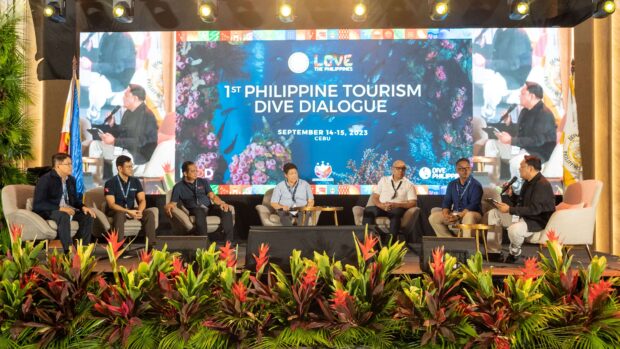
One of the panel discussions focused on Safety, Standards, And Accreditation Of Tourism-Related Establishments For Scuba Diving. The panel included Marco Angelo Ancheta, Executive Director of Philippine Commission on Sports Scuba Diving (PCSSD); Yvette Lee, Commissioner for Liveaboard / Dive Boats, PCSSD; Virgilio M. Maguigad, Director of the Office of Tourism Standards and Regulations, DOT; Romir S. Aglugub, Business Liaison for the Philippines, DAN World Asia; Engr. Emmanuel Carpio, Regional Director MARINA Region VII (who represented his colleague);and Jethro Nicolas F. Lozada, Assistant Chief Operating Officer for Assets Management, Tourism Industry and Enterprise Zone Authority
Panel 4 focused on Safety, Standards, And Accreditation Of Tourism-Related Establishments For Scuba Diving. The panel included Marco Angelo Ancheta, Executive Director of Philippine Commission on Sports Scuba Diving (PCSSD); Yvette Lee, Commissioner for Liveaboard / Dive Boats, PCSSD; Virgilio M. Maguigad, Director of the Office of Tourism Standards and Regulations, DOT; Romir S. Aglugub, Business Liaison for the Philippines, DAN World Asia; Engr. Emmanuel Carpio, Regional Director MARINA Region VII (who represented his colleague);and Jethro Nicolas F. Lozada, Assistant Chief Operating Officer for Assets Management, Tourism Industry and Enterprise Zone Authority.
In terms of safety standards on liveaboard dive experiences, safety standards, and regulations that operators should adhere to, Lee explained that they come under two other agencies: the Maritime Industry Authority (MARINA) and the Coast Guard. “[The safety standards we enforce include] the passenger safety certificate to allow us to sail and then also from the Coast Guard, of course, they inspect us prior to every trip. They have to see that the ship is seaworthy.
Engr. Carpio discussed that they formulate various safety requirements for recreational and commercial boats. “We came to see that there’s really an increasing number of recreational boats, [so] MARINA [found it important to formulate policies] for recreational boats, [requiring owners to present] certificates of ownership, registry, [and so on]. [For commercial boats,] there are three requirements: [first,] the safety certificate—we do an inspection before we issue the certificate; the manning requirement, the minimum manning [to operate] the vessel; and last is the commercial document, which is the permit to operate on smaller boats.”
Director Maguigad stressed that with the cooperation of the DOT and PCSSD, they have begun plans on establishing and strengthening more safety standards and regulations, specifically for dive operators and dive sites across the country. “Safety and sustainability are two of the basis of development in the Philippines. Secretary Christina Frasco has already signed the updated progressive accreditation system. It touches upon [topics like making] primary tourism enterprises adhere to a set of minimum standards.”
“With regard to the dive sector, of course, we have the PCSSD having the standards for the safety portion of the industry. Meanwhile, the DOT [will ensure] that the service quality is adhered to at the minimum level. That’s one of the things that we’d like to see, that tourists get their value for money, that they’re safe in their destinations.”
Lastly, Panel 5 explored further investment opportunities in the dive industry. Leading the panel was Representative Antonio Agapito B. Legarda of the Lone District of Antique, who traded insights with Marie Elaine Salvana-Unchuan, Regional Director of DOT Region X; Marco J. Inocencio, Manager, Atlantis Dive Resort, Negros Oriental; Nelia R. Arina, Regional Director of DOT Region XII; and Mr. Peter Tay, Vice President for Visayas, Tourism Congress of the Philippines.
To assess the notable investment opportunities in their region, Director Salvana-Unchuan shared that they first took account of their accredited dive operators and working dive sites. “We also did our dive exploration, which of course, needed the funding. We’re very lucky that the Secretary is a dive champion, so we were allowed to do our dive projects together. Then, of course, thirdly, we did create events like our dive festivals, which really generated a lot of interest from the dive community.”
“We really have to show what we have. We see the opportunity for a dive shop. We also see the business opportunity for liveaboards. I think most of the investment opportunities are in the dive facilities. But of course, if we do not bring that out and we do not show it first, then we won’t be able to get those investments,” the director added.
In terms of what investors are looking for and how they may be encouraged to invest in the Philippine dive industry, Hon. Legarda underscored the importance of government assistance and ease of investment. “[Another] thing they’ll be looking for is stability in terms of the policies of the local government and the national agencies when it comes to matters that will affect their businesses.”
“In terms of return of investment, one benchmark that we always use is returning guests. When you get a lot of returning guests, that means you’ve been doing your job pretty well. I know all of the dive operators here know that their favorite guests are the ones who come back because you know how to deal with them already and you know that you’ve done your job, that’s why they come back,” he concluded.
ADVT.
